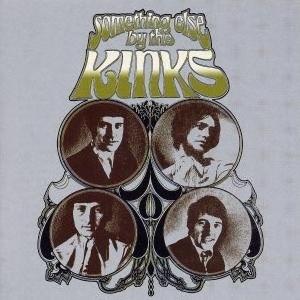
Something Else by the Kinks, often referred to simply as Something Else, is the fifth studio album by the English rock band the Kinks, released on 15 September 1967 by Pye Records. The album continued the Kinks' trend toward an eccentric baroque pop and music hall-influenced style defined by frontman Ray Davies' observational and introspective lyrics. It also marked the final involvement of American producer Shel Talmy in the Kinks' 1960s studio recordings; henceforth Ray Davies would produce the group's recordings. Many of the songs feature the keyboard work of Nicky Hopkins and the backing vocals of Davies's wife, Rasa. The album was preceded by the singles "Waterloo Sunset", one of the group's most acclaimed songs, and the Dave Davies solo record "Death of a Clown", both of which charted in the UK top 3.
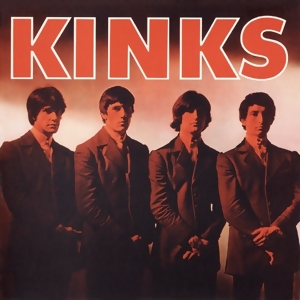
Kinks is the debut studio album by the English rock band the Kinks. It was released on 2 October 1964 in the United Kingdom by Pye Records. The original United States release, issued by Reprise Records on 25 November 1964, omits three tracks and is instead titled You Really Got Me.

Kinda Kinks is the second studio album by the English rock band the Kinks. It was released on 5 March 1965 in the United Kingdom by Pye Records. The original United States release, issued by Reprise Records on 11 August 1965, omits three tracks and substitutes the singles "Set Me Free" and "Everybody's Gonna Be Happy". Recorded and released within two weeks after returning from a tour in Asia, Ray Davies and the band were not satisfied with the production.
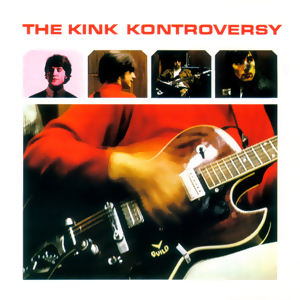
The Kink Kontroversy is the third studio album by the English rock band the Kinks. It was released in the United Kingdom on 26 November 1965 by Pye Records. Issued in the United States on 30 March 1966 by Reprise Records, it was the Kinks' first American album to feature an identical track listing to its British counterpart. It is a transitional album, with elements of both the earlier Kinks' styles and early indications of the future direction of Ray Davies' songwriting styles. The liner notes were written by Michael Aldred.

Think Visual is the twenty-second studio album by the English rock band the Kinks, released in 1986. It peaked at No. 81 on the Billboard chart.

The Kinks were an English rock band formed in London in 1963 by brothers Ray and Dave Davies. They are regarded as one of the most influential rock bands of the 1960s. The band emerged during the height of British rhythm and blues and Merseybeat, and were briefly part of the British Invasion of the United States until their touring ban in 1965. Their third single, the Ray Davies-penned "You Really Got Me", became an international hit, topping the charts in the United Kingdom and reaching the top 10 in the United States.

"Apeman" is a 1970 song by the English rock band the Kinks. It was written by Ray Davies and appears on the album Lola Versus Powerman and the Moneygoround, Part One. Written as a call to return to nature amidst the crowding and industry of the city, the song features calypso stylings. Like its predecessor, "Lola", it had to have a lyric re-dubbed for commercial release.

Misfits is the seventeenth studio album by the English rock band the Kinks, released in 1978. Following the minor success of Sleepwalker in the United States, Misfits featured a more rock-oriented style than many other Kinks records of the 1970s. It was their last album to feature pianist John Gosling and the only one to feature bassist Andy Pyle as a member, both of whom quit the band following internal conflicts. Despite this, the album made the Top 40 in America. The album also contained the minor hit single "A Rock 'n' Roll Fantasy", as well as less successful releases "Live Life" and "Black Messiah".

Word of Mouth is the twenty-first studio album by the English rock group the Kinks. It was released November 1984. "Do It Again" was released as a single from the album in 1985.
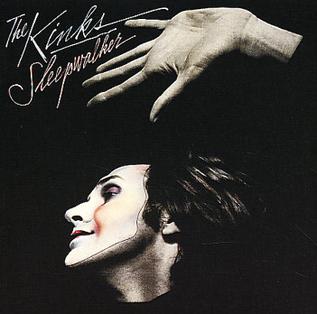
Sleepwalker is the sixteenth studio album by the English rock group, the Kinks, released in 1977. It marked a return to straight-ahead, self-contained rock songs after several years of concept albums. It is the first album in what critics usually call the "arena rock" phase of the group, in which more commercial and mainstream production techniques would be employed. The album also marks the last appearance of bassist John Dalton, who left the band during the recording sessions. Dalton plays bass on all songs on the album except for "Mr. Big Man". The lineup of the Kinks would be trimmed down significantly in 1977 following the album's release, as the brass section and backup singers were removed and the band returned to a standard rock band outfit.

UK Jive is the twenty-third studio album by the English rock group, the Kinks, released in 1989. It was the first album in almost three years since the 1986 album, Think Visual. At this point, it was the longest gap between album releases since the inception of the group. It was their last studio album to feature keyboardist Ian Gibbons who left during the sessions. Gibbons would later rejoin in time for the group's swan song live album To the Bone.
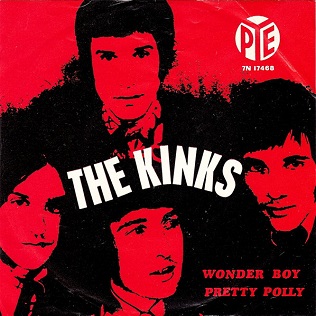
"Wonderboy" is a song by the English rock band the Kinks, written by Ray Davies. It was released as a non-album single in April 1968. It stalled at number 36 in the UK charts, becoming the band's first single not to make the UK Top Twenty since their early covers.

"I'm Not Like Everybody Else" is a song written by Ray Davies and first recorded by the Kinks in 1966 and released that year as the B-side of "Sunny Afternoon". The lead vocal is sung by Dave Davies, with occasional parts vocalized by his brother Ray, the band's usual lead singer. The song is a defiant anthem of non-conformity. It has been covered by various artists, notably the Chocolate Watchband in their 1968 rendition of the song, and by Australian band Jimmy and the Boys, who covered it as their debut single in 1979.
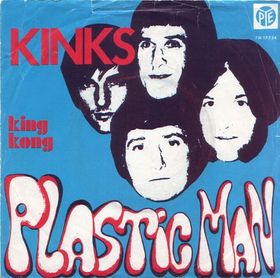
"Plastic Man" is a song written by Ray Davies and recorded by the Kinks in 1969.

"Polly" is a song by the English rock band the Kinks. It was released on a non-album single in April 1968, as the B-side to "Wonderboy". Written and sung by bandleader Ray Davies, the song was recorded in March 1968 during sessions for the band's 1968 album The Kinks Are the Village Green Preservation Society. Ray was initially inspired by the character Polly Garter in Dylan Thomas's 1954 radio drama Under Milk Wood, though his resulting character does not share anything with Thomas's besides the same name. The song is one of the few Kinks recordings from the late 1960s to possibly feature real strings, as arranged by David Whitaker.

"Drivin'" is a song written by Ray Davies of the Kinks which appeared on that group's 1969 concept album Arthur . It was released in the UK as the first single from the album, but failed to chart.

"Moving Pictures" is the final track on The Kinks' 1979 album Low Budget. Like the other ten tracks on the album, it was written by Ray Davies.

"She's Got Everything" is a song written by Ray Davies and released by English rock band the Kinks. It first appeared as the B-side of the Kinks' 1968 single, "Days".
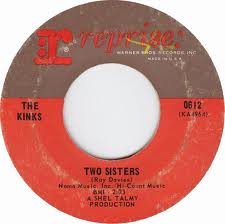
"Two Sisters" is the third track from the Kinks' 1967 album, Something Else by the Kinks. The song was written by Ray Davies.

Then Now and Inbetween is a promotional compilation album by the English rock band the Kinks. Reprise Records issued the album in July 1969 to journalists, radio program directors and disc jockeys in conjunction with the "God Save the Kinks" promotional campaign, which sought to reestablish the Kinks' commercial status in the US after their four-year ban on performing in the country.




















